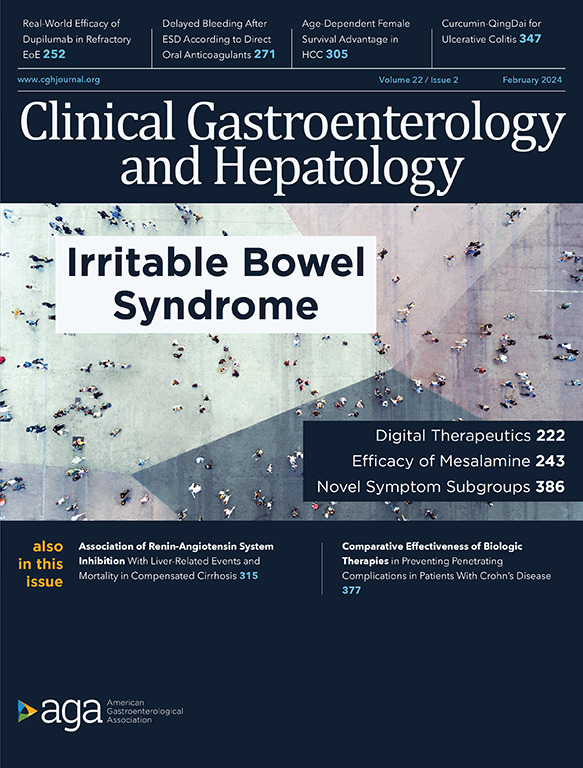Tenofovir Is Associated With a Better Prognosis Than Entecavir for Hepatitis B Virus–Related Hepatocellular Carcinoma
IF 11.6
1区 医学
Q1 GASTROENTEROLOGY & HEPATOLOGY
引用次数: 0
Abstract
Background and Aims
Whether tenofovir or entecavir has different effects on the prevention of hepatitis B virus (HBV)–related hepatocellular carcinoma (HCC) in secondary and tertiary preventive settings is still a matter of debate. This study aimed to compare the long-term prognosis of HCC between tenofovir and entecavir in patients with chronic hepatitis B.
Methods
Chronic hepatitis B patients diagnosed with HCC between November 2008 and December 2018 and treated with either entecavir or tenofovir at a tertiary center in Korea were included. The effect of tenofovir compared with entecavir on the prognosis of HBV-related HCC was assessed using multivariable-adjusted Cox and propensity score (PS)–matched analyses. Various predefined subgroup analyses were conducted.
Results
During a median follow-up period of 3.0 years, the mortality rate for entecavir-treated patients (n = 3469) was 41.2%, while tenofovir-treated patients (n = 3056) had a mortality rate of 34.6%. Overall survival (OS) was better in the tenofovir group (adjusted hazard ratio [aHR], 0.79; P < .001), which were consistently observed in the PS-matched analysis. The magnitude of the risk difference in OS was more prominent 2 years after the diagnosis of HCC (aHR, 0.50; P < .001) than 2 years before (aHR, 0.88; P = .005), and it was more pronounced in patients with earlier HCC stages. In all subgroups, except for those with shorter life expectancy, such as those with compromised liver function, tenofovir was associated with better OS compared with entecavir.
Conclusions
Among patients with HBV-related HCC, those treated with tenofovir had a better prognosis than those treated with entecavir, particularly among those with prolonged survival.

与恩替卡韦相比,替诺福韦对乙型肝炎病毒相关肝细胞癌的预后更好。
背景和目的:替诺福韦或恩替卡韦在二级和三级预防乙型肝炎病毒(HBV)相关肝细胞癌(HCC)的预防中是否具有不同的效果仍存在争议。本研究旨在比较替诺福韦和恩替卡韦治疗慢性乙型肝炎(CHB)患者 HCC 的长期预后:纳入2008年11月至2018年12月期间在韩国一家三级中心确诊为HCC并接受恩替卡韦或替诺福韦治疗的CHB患者。与恩替卡韦相比,替诺福韦对HBV相关HCC预后的影响采用多变量调整Cox和倾向评分(PS)匹配分析进行评估。研究还进行了各种预定义亚组分析:中位随访期为3.0年,恩替卡韦治疗患者(n = 3,469)的死亡率为41.2%,而替诺福韦治疗患者(n = 3,056)的死亡率为34.6%。替诺福韦酯组的总生存期(OS)更好(调整后危险比 [aHR],0.79;P < .001),这在 PS 匹配分析中也得到了一致观察。HCC确诊后2年(aHR,0.50;P < .001)与确诊前2年(aHR,0.88;P = .005)相比,OS的风险差异幅度更为显著,而且在HCC分期较早的患者中更为明显。在所有亚组中,除了预期寿命较短的患者,如肝功能受损的患者,与恩替卡韦相比,替诺福韦会带来更好的OS:结论:在HBV相关HCC患者中,接受替诺福韦治疗的患者预后优于接受恩替卡韦治疗的患者,尤其是在生存期较长的患者中。
本文章由计算机程序翻译,如有差异,请以英文原文为准。
求助全文
约1分钟内获得全文
求助全文
来源期刊
CiteScore
16.90
自引率
4.80%
发文量
903
审稿时长
22 days
期刊介绍:
Clinical Gastroenterology and Hepatology (CGH) is dedicated to offering readers a comprehensive exploration of themes in clinical gastroenterology and hepatology. Encompassing diagnostic, endoscopic, interventional, and therapeutic advances, the journal covers areas such as cancer, inflammatory diseases, functional gastrointestinal disorders, nutrition, absorption, and secretion.
As a peer-reviewed publication, CGH features original articles and scholarly reviews, ensuring immediate relevance to the practice of gastroenterology and hepatology. Beyond peer-reviewed content, the journal includes invited key reviews and articles on endoscopy/practice-based technology, health-care policy, and practice management. Multimedia elements, including images, video abstracts, and podcasts, enhance the reader's experience. CGH remains actively engaged with its audience through updates and commentary shared via platforms such as Facebook and Twitter.

 求助内容:
求助内容: 应助结果提醒方式:
应助结果提醒方式:


